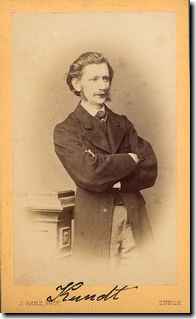August Kundt
August Kundt (born November 18, 1839 in Schwerin , † May 21, 1894 in Israelsdorf ( Lübeck )) was a German physicist .
Life
August Kundt studied physics and mathematics from 1859 , first in Leipzig, then in Berlin. Here was Heinrich Gustav Magnus , his teacher, where he received his doctorate. 1864 His preoccupation with optics and acoustics led to the development of the Kundt dust tube named after him in 1866 . The teaching license it acquired in 1867. A year later he became a professor at the Polytechnic in Zurich . In 1870 he accepted a position at the University of Würzburg . While working there, he discovered the dispersion of gases. From 1872 Kundt was entrusted with setting up the Physics Institute at the University of Strasbourg . At this institute in 1876 he proved the monatomic nature of mercury vapor . 1888 he succeeded in manufacturing managed a metal mirror by sputtering . In the same year he received an offer from the University of Berlin , which he accepted.
Kundt's students included his assistants Wilhelm Conrad Röntgen and Franz Exner .
The Kundt lunar crater is named after him.
Honors
1893: Order Pour le Mérite
1956: Honorary grave of the city of Berlin in the Dorotheenstadtischer Friedhof II , Liesenstr. 9 (grave system) (MHZ-2-32 / 33)
1976: crater Kundt
literature
- Andreas Kleinert: Kundt, August. In: New German Biography (NDB). Volume 13, Duncker & Humblot, Berlin 1982, ISBN 3-428-00194-X , p. 291 ( digitized version ).
- Stefan L. Wolff, August Kundt (1839-1894): The career of an experimental physicist, Physis 29.2 (1992), pp. 403-446.
Individual evidence
- ^ Heinz Otremba: Wilhelm Conrad Röntgen. A life in the service of science. A documentation with a scientific appreciation by Walther Gerlach . Franconian company printing house, Würzburg 1970, pp. 12 and 14.
| personal data | |
|---|---|
| SURNAME | Announces, August |
| ALTERNATIVE NAMES | Kundt, August Adolph Eduard Eberhard (full name) |
| BRIEF DESCRIPTION | German physicist |
| DATE OF BIRTH | November 18, 1839 |
| PLACE OF BIRTH | Schwerin |
| DATE OF DEATH | May 21, 1894 |
| Place of death | Israelsdorf , Lübeck |

